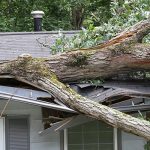Florida lawmakers passed an important bill (SB 76) on the last day of their 2021 legislative session that makes major changes to the state’s property insurance market. Governor DeSantis signed the bill into law a few days later, and it will take effect on July 1, 2021. The changes incorporated into the bill could cause higher rate increases for customers of the state-backed Citizens Property Insurance Corp., as well as make it more difficult for homeowners to successfully litigate a roof damage claim.
Why Did the Florida Legislature Consider a Property Insurance Reform Bill?
SB 76 was introduced in the Senate in an attempt to reform the state’s property insurance industry after regulators last year signed off on dozens of rate increases that topped 10 percent. As a result of the tightening insurance market, Citizens Property Insurance Corp. gained more than 120,000 policies.
Insurers claim that the homeowner’s insurance market lost over $1.5 billion in 2020. They also claim that litigation costs and questionable — even fraudulent — roof damage claims have caused the rate increases and forced more homeowners to purchase policies through Citizens, an insurer of last resort for Florida homeowners.
What Is Included in Florida Senate Bill 76?
Proponents of the changes included in SB 76 contend that those changes are necessary to reduce fraud and reign in the out-of-control insurance industry in the Sunshine State. Those who argued against the bill are concerned that it will lead to higher premiums for low-income homeowners and make it more difficult for insured homeowners to get reimbursed for roof damage.
So how will SB 76 impact you if you are a Florida homeowner? A few of the changes incorporated into SB 76 include:
- Changes to Citizens Property Insurance Corp. The new law changes the eligibility, rate glide path, and actuarily sound rate indication for Citizens Property Insurance Corp.
- Changes to attorney fees for litigating insurance claims. SB76 replaces the one-way attorney fee statute and makes the recovery of attorney fees and costs contingent on obtaining a judgment for indemnity that exceeds the pre-suit offer made by the insurance company.
- Changes to the current statute of limitations for making an insurance claim. The law reduces the claims deadline on all claims to two years from the date of loss. The only exception to the two-year statute of limitations is for supplemental claims which will have an additional year.
- Addition of a pre-suit demand requirement. Plaintiffs will now be required to file a pre-suit demand at least 10 days before filing a lawsuit against an insurer that includes an estimate of the demand, the attorney fees and costs demanded and the amount in dispute; disallows pre-suit notices to be filed before the insurance company makes a determination of coverage; and allows an insurer to require mediation or another form of alternative dispute resolution after receiving notice.
- Prohibition of advertising for roof claims. The law now makes it illegal for roofing contractors or any person acting on their behalf to make a “prohibited advertisement,” including an electronic communication, phone call, or document that solicits a claim.
- Restriction of third parties from assisting with claims. The law prohibits the offering of anything of value for performing a roof inspection, an offer to interpret an insurance policy or file a claim or adjust the claim on the insured’s behalf.
- Requirement for cost estimates. SB 76 prohibits a contractor from providing repairs for an insured with a contract for repairs that does not include a detailed cost estimate of the labor and materials required to complete the repairs.
- Implementation of fines for violations. Roofers who violate the new insurance law face a potential $10,000 fine for each violation.
What Does SB 76 Mean for Florida Homeowners?
If the legislation works as proponents hope, homeowners will begin to have more options when purchasing insurance, as private carrier markets open up to them. They are also hopeful that premiums will eventually decrease because insurers will lose less money to litigation and fraudulent claims.
Unfortunately, the bill may also result in higher rate increases for homeowners who are forced to purchase policies from Citizens Property Insurance Corp. It may also make it harder for homeowners who have suffered roof damage to recognize that they have coverage and to successfully file a roof damage claim with their insurance provider. If litigation becomes necessary, the new law may also make litigation more difficult and costly.
If you are a Florida homeowner, it is in your best interest to learn more about the new law and how it may impact your current or future homeowners’ insurance premiums and coverage. Talking with insurance company representatives about their policies and asking an experienced Florida insurance claim attorney for guidance could provide the help you need.
As the 2021 hurricane season progresses, it is especially important to make sure you understand the coverage your homeowners’ policy provides and have the insurance coverage you need to protect your property. If your home is damaged during a storm and your insurance claim is denied, delayed or undervalued, contact the leading Orlando hurricane damage attorneys for sound legal advice and powerful advocacy.




